[Editor's Note] On the basis of comprehensive epidemic prevention and control, the university successfully held a series of activities to commemorate the 80th anniversary of the founding of the university in September of the golden autumn. In the second half of the year, the university will welcome the 15th party congress. Standing at the new historical starting point, when the new journey of building a world-class university with Chinese characteristics is fully started, in order to comprehensively display the achievements made by the university since the 14th Party Congress, the Propaganda Department of the Party Committee specially launches a series of special reports on "Forging Ahead, Brilliant Northern Polytechnic University" to create a good atmosphere of upward mobility and passionate progress, and to unite teachers, students and staff to The series of special reports are intended to create a good atmosphere of upward mobility and enthusiasm, and to gather the majestic strength of students, faculty and staff to unite and strive for first-class.
As socialism with Chinese characteristics enters a new era, the Party and the country urgently need to cultivate a large number of high-level talents with both virtues and talents for the development of the Party and the country, which is about to march towards a new journey of building a modern socialist country on the basis of winning the victory in building a moderately prosperous society and fighting against poverty.
-- General Secretary Xi Jinping gave important instructions on postgraduate education work
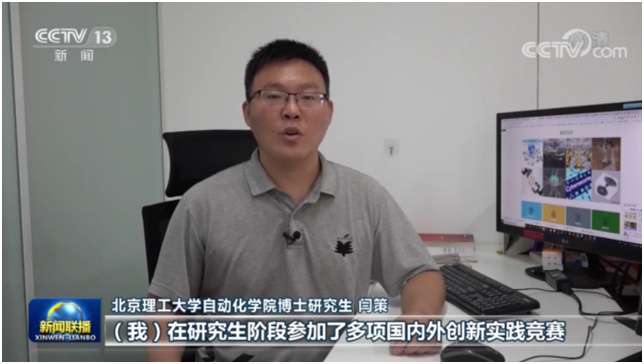
Doctoral student Yan Ce interviewed by CCTV "news broadcast
"At the postgraduate level, I participated in a number of domestic and international innovative practical competitions and postgraduate science and technology innovation projects, laying a solid foundation for scientific research." July 28, 2020, the day before the National Conference on Graduate Education, in the CCTV "news broadcast" focus on graduate education to serve the major strategic needs of the country's report, involved in the "Tianqian 1" Mars research mission of the Beihang PhD student Yan Ce said so in the face of the camera.
Graduate education shoulders the important mission of training high-level talents and innovation and creation, and is an important cornerstone of national development and social progress. Innovative talent training system, accelerate the cultivation of high-level talents urgently needed by the country, facing the needs of the Party and the country, how to deliver a satisfactory answer to the people?
Since the 14th Party Congress, Beijing University of Technology has always been guided by Xi Jinping's thought of socialism with Chinese characteristics in the new era, and has been adhering to the philosophy of postgraduate education, which is "to achieve far-reaching results with clear virtue, broad foundation, profound knowledge, and inclusive innovation", deepening the reform, promoting the integrated training of talents for undergraduate and doctoral degrees, and giving full play to multidisciplinary intersection, scientific research projects, platforms, and team training. The university has also been able to further highlight the characteristics of science-education integration and industry-education integration, and has achieved remarkable results in cultivating high-level innovative talents and improving its ability to serve national strategic needs and economic and social development.
Integration of undergraduate and doctoral degree, injecting strong momentum for the cultivation of top innovative talents
"The biggest feeling I got from this course is that it is very rich in content and has a clear pulse. The course integrates the multidisciplinary contents of mechanics of continuous media, solid mechanics, mechanics of materials, structural mechanics, experimental mechanics, etc., with a wide range of knowledge and outstanding focus. Although it was an undergraduate course, the knowledge I learned at that time was very helpful for my later research at the graduate level. For example, tensor analysis in mechanics of continuous media is an essential tool in my research." Li Zhangyu, a 2015 undergraduate student at the Xutri College and recommended as a PhD student at the School of Astronautics in 2019 on an exemption basis, has a lot of feelings about the disciplinary core coherence course "Mechanics of Materials and Structures" that he once took.
In 2016, the XUTL College and four professional colleges of the College of Astronautics, the College of Mechanics and Vehicles, the College of Information and Electronics, and the College of Automation offered disciplinary core through courses for undergraduates to expand students' academic horizons and stimulate innovative thinking. in 2018, such courses covered our professional colleges of science and technology.
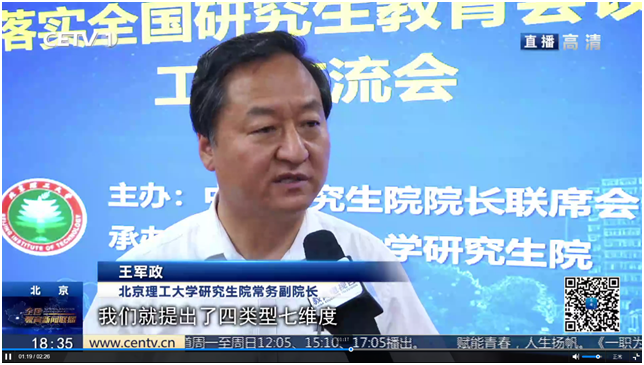
Wang Junzheng introduced the university's integrated undergraduate and doctoral training system for top
innovative talents on the National Education News
"After the formation of one curriculum for undergraduate and master's degree, our undergraduate students who are guaranteed to study in graduate school and direct doctorate can study graduate courses in their senior year in advance, so as to squeeze out more research time for the graduate stage to cultivate students' practical innovation ability and produce more high-level research results; for graduate students with interdisciplinary majors or weak disciplinary foundation, they can take core courses of undergraduate majors to supplement and strengthen disciplinary majors For interdisciplinary majors or graduate students with weak disciplinary foundation, they can take core courses of undergraduate majors to supplement and strengthen the basic knowledge of disciplines. They can also take courses across disciplines and colleges according to their research directions. At the same time, undergraduates entering their third year are provided with mentors for one-on-one guidance and personalized training. Therefore, the undergraduate master's and doctoral degree through model has a good promotion effect on the cultivation of innovative talents." Wang Junzheng, Executive Vice President of Graduate School, talked about it in an interview with China Education Television's National Education News Broadcast.
It is an important initiative of the university to meet the needs of talent cultivation in the new era and the construction of "double first-class", and the top-level design further optimizes the degree of adaptation between discipline direction and professional foundation. The system of integrated undergraduate and doctoral training includes integrated curriculum study, practical training, quality education, international education, research and innovation cultivation; the establishment of "3+X" dynamic adjustment mechanism based on students' personal interests and abilities, which is in line with the law of growth of top innovative talents; the construction of an endogenous motivation mechanism to stimulate the discipline and research superiority resources to invest in talent cultivation; and the establishment of an endogenous motivation mechanism for the development of top innovative talents. The program provides a scientific growth path and a vibrant cultivation mechanism for the top innovative talents. In 2018, the "Exploration and Practice of Integrated Cultivation of Undergraduate and Master's Degree Based on the Law of Talent Growth" was awarded the second prize of the National Education Teaching Achievement.
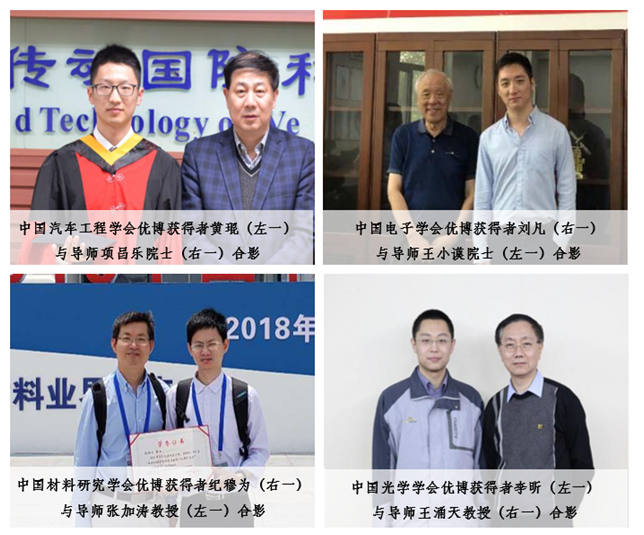
"During my undergraduate years, I published two papers accepted in SCI journal sources, two papers accepted in EI sources, and applied for two invention patents. This is due to the fact that I was able to enter the laboratory and get in touch with scientific research earlier. during my sophomore year in 2016, under the guidance of my undergraduate supervisor Li Zhen, I entered the laboratory to study, read literature, write reports, do experiments and program with my brothers and sisters, and slowly familiarize myself with the scientific research process from one small thing to another. After more than two years of research practice during my undergraduate years, I have further defined my research direction, and also laid a solid foundation for my research during my PhD." Gong Hengheng, a 2015 undergraduate student of the Xutri College and 2019 PhD student of the School of Automation, talked about the rewards of the integrated training of undergraduates and PhDs.
Since 2016, our university has achieved remarkable results in the cultivation of top-notch innovative talents. Graduate students have published 168 ESI highly cited papers and 19 Nature/Science sub-journal papers as the first author, and the number of SCI/SSCI papers published per capita of awarded PhD has increased from 1.4 to 2.7, and graduate students have been awarded 96 excellent dissertations by the Society, which ranks the second in the number of national universities.
Integration of science and education, multidisciplinary crossover, planting fertile ground for the
cultivation of top innovative talents
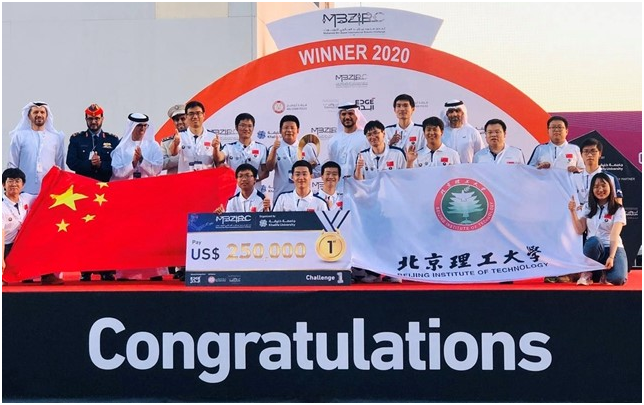
The "Flying Eagles" team, which won the 2020 Mohammad Bin Zayed International Robotics Challenge, poses on the podium
"BeIT, the champion!" The Mohammed Bin Zayed International Robotics Challenge 2020 (MBZIRC2020) in Abu Dhabi, UAE, came to an end with enthusiastic cheers. As the only Chinese team participating in the competition, BeIT's "Flying Eagle" team defeated 23 teams from top international universities and research institutions and won the championship of "Multi-machine Collaborative Autonomous Aerial Ball Capture" with the only perfect score, following the "UAV Mobile Target Detection" competition in 2017. The team won the championship in "UAV Moving Target Detection and Autonomous Take-off and Landing" after winning the championship in 2017.
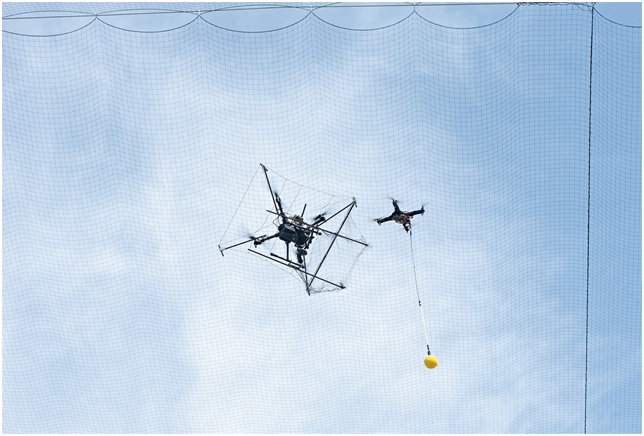
"Flying Eagle UAV performing its mission on the field of play
"The competition was held at the UAE National Exhibition Center, and the field was similar to a soccer field, with a drone in the air dragging a small yellow ball in an '8' shape trajectory. Five randomly placed two-meter-high poles on the ground with free-floating balloons were used for jamming. The participating UAVs were required to take the shortest time to autonomously track the target machine to grab the yellow ball while piercing the jamming balloons placed on the poles. The competition focused on assessing cutting-edge technologies of unmanned intelligent systems such as machine vision, autonomous control, cluster collaboration and surprise defense in complex contexts." Speaking of the competition, Song Tao, the instructor of the "Flying Eagles" team of the College of Astronautics, still has a vivid memory.
At present, the "flying eagle" team has achieved the transformation of a number of core key technologies to serve the national strategic needs, to solve the "neck" technology bottleneck. At the same time, they also focus on the national strategic goal of poverty alleviation, research and development based on the UAV cluster of complex terrain, fruit and forest farmland precision management system, for the regional economic transformation and development to provide intellectual support. The accomplished "Flying Eagles" team is a team mainly composed of postgraduates, and so far in 2019, the postgraduate team members have published more than 20 SCI-indexed papers, including 8 in top journals. Behind the championship is the cross-fertilization of aircraft, computer, vision, navigation, control, machinery, information and other disciplines, collision thinking, innovation and breakthroughs, but also the beneficial attempts of the university to train high-level innovative talents on a large multidisciplinary interdisciplinary research platform.
He has won two consecutive championships of Mohammad Bin Zayed International Robotics Challenge (MBZIRC), "RoboMaster" International Artificial Intelligence Challenge, National "Internet+" and "Challenge Cup". The first prize of the national "Internet+", "Challenge Cup" and "Youth Creation" competitions, the first prize of the postgraduate robotics, artificial intelligence, electronic design and mathematical modeling competitions... ...Postgraduates have repeatedly won the championship, cups and gold medals in important competitions at home and abroad, thanks to the university's talent cultivation model of science and education integration and the effective play of the nurturing role of the large platform of interdisciplinary disciplines. In recent years, the university insists on taking the major needs of the country as the traction, condenses scientific problems and carries out technical research, which greatly promotes technological innovation in frontier basic and key fields, and creates the characteristic cultivation model of transforming scientific research advantages into personnel training achievements.
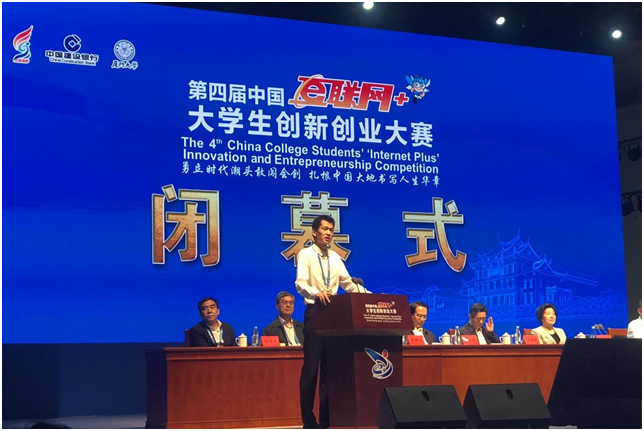
Ni Jun spoke as a student representative in the closing ceremony of the 4th China "Internet+" Student
Innovation and Entrepreneurship Competition
"The theory, technology and industry chain pattern of unmanned cars are completely different from traditional cars, and this is an important historical opportunity to let all this be defined by us Chinese in the future." In the 4th China "Internet+" Student Innovation and Entrepreneurship Competition, the impassioned speech of Ni Jun, a PhD student of BeIT who won the overall championship, resonated with the audience and judges. 2019, Ni Jun graduated and stayed in school to teach. Thanks to the high-level research platform and the atmosphere of determination to strengthen the country, Ni Jun is determined to study and serve his country, and grow up to become a top young talent in the field of automotive research in China.
The new round of scientific and technological revolution and industrial changes have given birth to new and interdisciplinary disciplines, and disruptive technologies are constantly emerging. The new technological revolution characterized by big data, Internet of Things, artificial intelligence and new energy has driven profound changes in industries, and the demand for complex innovative talents has become more urgent. Relying on the high-level platforms such as "2011 Collaborative Innovation Center", "Beijing High Precision Center", national or provincial key laboratories and engineering centers, the university has developed new energy vehicles, unmanned aerial vehicles, humanoid robots, femtosecond laser processing technology, new system radar, digital performance simulation, ground unmanned technology, and other technologies. The university has built a knowledge system with vertical integration of master's degree and horizontal crossover of multiple disciplines, oriented to the research of large systems such as new energy vehicles, unmanned aircraft, humanoid robots, femtosecond laser processing technology, new system radar technology, digital performance simulation, ground unmanned platform and virtual reality. Through the implementation of the multidisciplinary cross-composite innovative talent cultivation model, students' scientific and technological innovation and practical ability have been greatly enhanced, and the number of postgraduates winning high-level science and technology competition awards at home and abroad reached 232 in 2019, which is three times of that in 2016; postgraduates have participated in winning 8 national and provincial science and technology achievement awards in the past four years. Meanwhile, "Exploration and practice of multidisciplinary and university-enterprise integration of compound top-notch innovative talents cultivation model with large system orientation" won the first prize of Education Teaching Achievement Award of Chinese Society of Degree and Postgraduate Education in 2018.
Integration of industry and education, school-enterprise alliance, highlighting the characteristics
for the cultivation of top-notch innovative talents
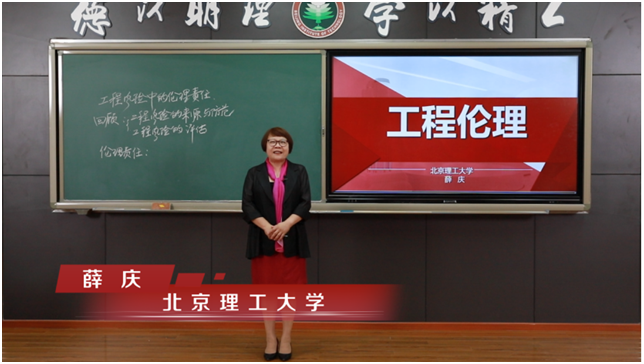
Professor Xue Qing, the lecturer of the course "Engineering Ethics", gives a lesson to the students
"The course adopts a combination of lecture and case teaching to bring students into concrete and complex situations, forming a participatory, open and inspiring classroom atmosphere. Through in-depth seminars, it promotes students' thinking and discernment on complex practical issues, enhances their sensitivity to academic and professional ethics, improves academic and professional literacy, and strengthens their sense of social responsibility." As the main teacher of the course "Engineering Ethics", Professor Xue Qing, a national model teacher, introduced it in this way.
As China's economy enters the stage of high-quality development and industrial transformation and upgrading accelerates, various industries have put forward higher requirements on the professionalism, knowledge ability and professional degree of practitioners. In order to cultivate high-level composite and application-oriented leading talents with solid basic knowledge, strong professional ability and excellent professionalism, who have the ability to solve industrial application technology problems and undertake engineering technology research projects, and to solve the problem of homogenization of academic and professional degree graduate training, the university has carried out the teaching reform of professional degree graduate courses since 2016, and systematically built the professional degree graduate course system .
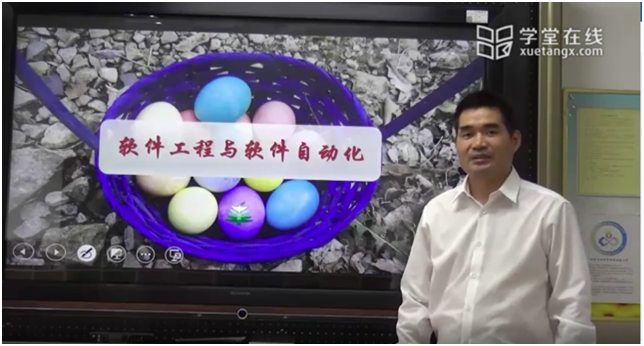
"Software Engineering and Software Automation", a major construction project of national online courses for postgraduate education of professional engineering degrees, was selected as one of the online courses of "Xuedang Online".
It is against this background that, adhering to the curriculum construction concept of "thick basic theory, practical application and frontier knowledge", and insisting on the principle of broad-caliber cultivation in line with the engineering reality and the law of growth of engineering talents, the university has built more than 500 professional degree courses such as "Engineering Ethics", and the curriculum system of professional degree and academic graduate courses has been distinguished by more than 50%. The degree of differentiation between professional degree and academic graduate courses is more than 50%. Courses such as "New Energy Application Technology for Automobile", "Software Engineering and Software Automation", "Digital Media Science", "CAD/CAM Technology", "Polymer Synthetic Materials" and "Advanced Biological Separation Engineering" have been approved as "Major Construction Projects of National Online Courses for Professional Degree Graduate Education of Engineering Master".
"With the guidance and help of my supervisor and project team members, I developed a new algorithm that can solve the system dynamics and binding force in real time, and designed a space robot trajectory tracking controller with strong immunity and fast convergence. The results of the project have provided the cooperative with simulation software and control strategies with engineering guidance, provided an important basis and support for the design of key structures of space robots, and provided an effective solution to the problem of in-orbit assembly and maintenance of large spacecraft by space robots." Fei Liu, a 2016 master's degree student in aerospace engineering, participated in the internship practice project on "Dynamics and control of multi-arm cooperative movement of space robots" at the Institute of Control Engineering, China Academy of Space Technology, Beijing, during her master's degree. She was impressed by this practical exercise, which provided her with a clear direction for her subsequent research.
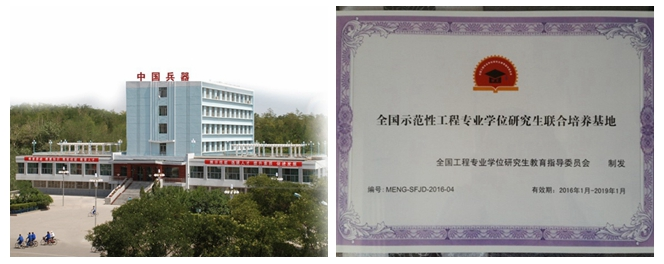
The Practice Base for Cultivating and Innovating Applied Talents was awarded as "National Model Base for Joint
Cultivation of Engineering Degrees
One of the keys to improve the quality of postgraduate training is to link theory with practice. Since 2016, the university has built 175 professional degree practice bases. Ltd. and Inner Mongolia First Machinery Group Co., Ltd. were awarded the second and third "National Model Base for Joint Cultivation of Engineering Degree Postgraduates" respectively; meanwhile, it was approved as At the same time, it was awarded 1 "Cultivation Base for Postgraduates of Ministry of Industry and Information Technology" and 32 "Industry-University-Research Bases in Beijing". In addition, it also jointly cultivates doctoral students with 12 research institutes such as the Institute of Weapons Science and the China Institute of Engineering Physics. It has formed a good cultivation ecology that the school is the main body and local industries, famous enterprises and research institutes cooperate to cultivate professional degree graduate students.
In recent years, the enrollment scale of professional degree master students in the university has increased from 1,400 in 2016 to 1,950 in 2020, accounting for more than 50% of the total number of graduate students; the field of engineering doctorate has been expanded from the original 2 to 4, and the enrollment scale of engineering doctorate has increased from 16 in 2016 to 216 in 2020. Since 2016, 5 people have been awarded "Outstanding Achievements in Practice of Engineering Master" and 29 people have been awarded "Outstanding Contribution to Engineering Master".
"The times are the question markers, we are the answerers, and the people are the markers." Postgraduate education plays an important role in cultivating innovative talents, improving innovation ability, serving economic and social development, and promoting the modernization of national governance system and governance capacity. Facing the new stage of development and the construction of "double first-class", the university will set out again with vigor, and move forward with more vigor to cultivate high-level talents of both virtues and talents!
Source:Beijing University of Technology News Date:2020-11-15 Editor:Wu Nan Review:Lin Wei, Wang Junzheng
Secretariat of ACGS
Nov. 15th,2020

